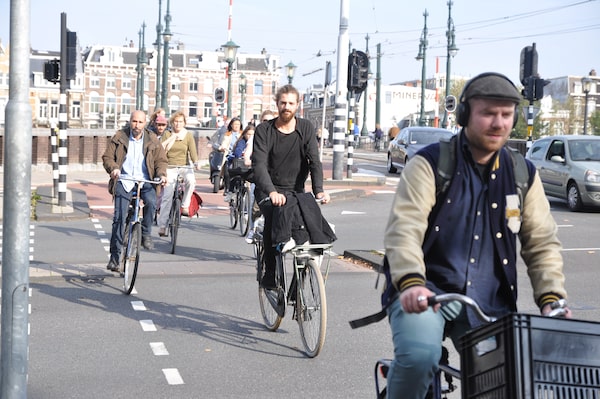
Vancouver has been named in the top 20 of the Copenhagenize Index for the first time.Copenhagenize Design/Handout
Two Canadian cities rank among the top 20 most bicycle-friendly in the world, according to a new study.
Vancouver made it onto the list for the first time while Montreal moves up two places since 2017. both are tied for the 18th spot in the 2019 Copenhagenize Index. They are the only North American cities that made the cut.
“Toronto is not close to being in the top 20 in any way,” says Morten Kabell, chief executive officer of Copenhagenize Design Co., the urban-planning consultancy that has authored the biannual ranking since 2011.
As Copenhagen’s former mayor of technical and environmental affairs, Kabell says he didn’t feel safe cycling in Toronto the few times he visited. This is the same city where, in 2007, then-councillor Rob Ford says, “What I compare bike lanes to is swimming with the sharks. Sooner or later, you’re going to get bitten.”
For the 2019 Index, researchers considered over 600 cities with populations of more than 600,000 people, ranking 115 of them for their efforts toward “reestablishing the bicycle as a feasible, accepted and practical form of transport.” Researchers awarded points to cities across 14 categories, including infrastructure, bicycle modal share, gender split, image and indicators of safety.
“Toronto needs to do something,” Kabell says. “It’s sad to see that safe, green and active transport is not a thing that’s being prioritized."
The number of fatal collisions involving cyclists in the city have increased over the past 10 years, according to Toronto Police data.
On the other hand, the Index found that Vancouver has done a good job of steadily adding to its network of protected bike lanes. And this despite what the study called, “loud public bikelash” against new infrastructure.

Vancouver has added to its network of protected bike lanes, despite a public 'bikelash.'Copenhagenize Design/Handout
Vancouver had the highest bicycle modal share of any city in Canada. That, combined with increasing use of cargo bikes by local businesses, infrastructure designed for cyclists of all-ages and all-abilities, and new protected bicycle parking stations near public transit, all helped land the city a spot in the top 20.
“[In Vancouver] you see a bicycle culture that was more associated with sport now becoming more for the 99 per cent, people who just want to get to work fast,” Kabell says.
“To improve its position, [Vancouver] needs to expand protected cycling infrastructure out into the suburbs,” he added. “I’m in no doubt that Western Canada and B.C. can really be represented as one of the best bicycling areas in the world.”
Montreal, the only North American city among the top 20 every year since 2011, slipped down the ranking recently due to neglected infrastructure. However, the report noted that "the new administration has put forward the boldest bicycle-focused project that Montreal has ever seen.”

Montreal is the only North American city that has made the top 20 every year since 2011.Copenhagenize Design/Handout
Valérie Plante, the mayor of Montreal, is quoted saying: “So many Montrealers would like to ride their bikes on a daily basis, but they do not dare to do so because the infrastructure is unsafe and they fear for their lives. Montreal’s bike network was built in the 1980s and is no longer adapted to our reality. New infrastructure needs to be built to meet the needs of today's cyclists.”
All Canadian cities pale in comparison with the top-three bicycle-friendly cities on the list: Copenhagen, Amsterdam and Utrecht.

In terms of cycling infrastructure, Canadian cities pale in comparison to Amsterdam, one of the most bike-friendly in the world.Copenhagenize Design/Handout
It’s easy to see why Copenhagen is ranked so highly. More than 60 per cent of Copenhageners commute to work or school by bicycle. Collectively, the city of 620,000 people ride 1.44 million kilometres every day, which is 2.3 km a person, every day. The region built 187 km of new “cycle highways.” These wide, well-lit lanes stretch 20 km from the city centre into the suburbs. The traffic lights on those routes are synchronized so a cyclist will rarely encounter a red light.
By comparison, as of early 2019, Toronto has built just 39 km of separated cycle tracks – total.
Shopping for a new car? Check out the new Globe Drive Build and Price Tool to see the latest discounts, rebates and rates on new cars, trucks and SUVs. Click here to get your price.
Stay on top of all our Drive stories. We have a Drive newsletter covering car reviews, innovative new cars and the ups and downs of everyday driving. Sign up for the weekly Drive newsletter, delivered to your inbox for free. Follow us on Instagram, @globedrive.